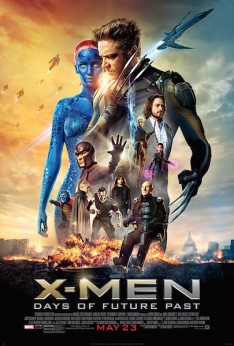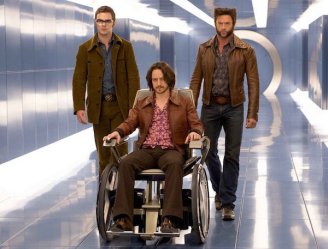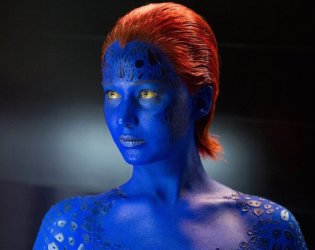2014 #113
Bryan Singer | 132 mins | Blu-ray | 2.40:1 | USA & UK / English | 12 / PG-13
 I think I’ve previously discussed my life-long love of the X-Men franchise, so I shan’t go into detail again, but suffice to say Days of Future Past has been one of my most-anticipated movies ever since the title (which is that of a classic and influential story from the comics) was announced. Thank goodness, then, that the final result doesn’t disappoint.
I think I’ve previously discussed my life-long love of the X-Men franchise, so I shan’t go into detail again, but suffice to say Days of Future Past has been one of my most-anticipated movies ever since the title (which is that of a classic and influential story from the comics) was announced. Thank goodness, then, that the final result doesn’t disappoint.
After two Wolverine-focused spin-offs and a ’60s-set prequel, Days of Future Past returns us to the world of the original X-Men movie cast — Sirs Patrick Stewart and Ian McKellen and all the rest. Only now it’s a future dystopia, where mutants are killed or imprisoned by giant robots called Sentinels. A gang of former X-Men led by Kitty Pryde (Ellen Page) think they’ve worked out a way to send someone back in time to before the incident that incited this terrible future, so that they can stop it. The man chosen is — of course — Wolverine (Hugh Jackman). Transported back into his 1970s body, Wolverine must find the younger Professor Xavier (James McAvoy), reunite him with an imprisoned younger Magneto (Michael Fassbender), and stop younger Mystique (Jennifer Lawrence) from assassinating the inventor of the Sentinels, Bolivar Trask (Peter Dinklage). Throw in almost every other mutant who’s ever appeared in the extensive ensemble casts of the four previous X-Men movies, and you’ve got yourself an epic — reportedly the second-most-expensive film ever made by 20th Century Fox (after Avatar).
There’s an awful lot going on in Days of Future Past, which, if you want to dig into it, makes for quite a rich film. There’s the obvious need to balance major storylines taking place in both the past and the future, though the latter has been sacrificed to focus on the former — quite literally, in the sense that a subplot centred around Anna Paquin’s Rogue was famously deleted (leaving Paquin with high billing for a three-second cameo). There’s also the inevitable complexity of time travel stories — how do changes in the past impact on the future, etc.  Beyond that, there’s the characters: the younger versions are having to deal with the fall-out from First Class, which tore apart friendships and families; meanwhile, Wolverine is having to deal with a new level of responsibility and maturity — he is, almost literally, having to do for Charles what the professor did for him back in the first X-Men movie.
Beyond that, there’s the characters: the younger versions are having to deal with the fall-out from First Class, which tore apart friendships and families; meanwhile, Wolverine is having to deal with a new level of responsibility and maturity — he is, almost literally, having to do for Charles what the professor did for him back in the first X-Men movie.
You wouldn’t think of an X-Men feature being an actors’ movie, and at the end of the day it’s not really, but there’s enough material for a quality actor like McAvoy to sink his teeth into. When we meet him Charles is a disillusioned drug addict, entirely different to the man we know from First Class and his future as Patrick Stewart. He’s forced to face his demons in every way possible: stopping his drugs, accepting his mutant superpowers, facing up to the man who did this to him, and the woman he raised as a sister but who turned on him… None of this is necessary to serve the blockbuster spectacle that the film also excels in, but it makes for deeper viewing than your average 2010s tentpole.
If McAvoy is the star, many of the rest of the cast do alright. As mentioned, Jackman has a bit on his plate as a one-time loner trying to become a teacher. Jennifer Lawrence is best served, the depth of her role no doubt bolstered by her Oscar-winning success elsewhere in the acting world. Although the original story also features Mystique as the antagonist, she’s far less conflicted: it’s a straight-up assassination attempt. The dilemmas that leave her torn between Xavier and Magneto are entirely an invention of the film franchise, but they make for a much more interesting story — it’s genuinely unpredictable what she’ll do and who she’ll side with.
 Not everyone gets to shine in a cast this big, although pretty much everyone gets a moment. The future-set cast have the least to do, people like Halle Berry turning up to do little more than show their face, though Stewart and McKellen get a moment or two worthy of their talents. After he was the focus of the last film, Fassbender is slightly shortchanged here; but after McAvoy gave him essential support in First Class, Fassbender plays the same service here, informing Charles’ journey. Of the new additions, Evan Peters as Quicksilver (that’s the one who’ll also be played by Aaron Taylor-Johnson in Avengers: Age of Ultron) gets both laughs and the film’s stand-out action sequence, as he races around a room, literally faster than a speeding bullet, to save our heroes. Dinklage, on the other hand, is underused. As with Stewart and McKellen, the fact he’s an excellent actor brings extra layers to the little he does have to do, but if you want to see what he can really do you’ll need to get your Game of Thrones box sets back out.
Not everyone gets to shine in a cast this big, although pretty much everyone gets a moment. The future-set cast have the least to do, people like Halle Berry turning up to do little more than show their face, though Stewart and McKellen get a moment or two worthy of their talents. After he was the focus of the last film, Fassbender is slightly shortchanged here; but after McAvoy gave him essential support in First Class, Fassbender plays the same service here, informing Charles’ journey. Of the new additions, Evan Peters as Quicksilver (that’s the one who’ll also be played by Aaron Taylor-Johnson in Avengers: Age of Ultron) gets both laughs and the film’s stand-out action sequence, as he races around a room, literally faster than a speeding bullet, to save our heroes. Dinklage, on the other hand, is underused. As with Stewart and McKellen, the fact he’s an excellent actor brings extra layers to the little he does have to do, but if you want to see what he can really do you’ll need to get your Game of Thrones box sets back out.
For those that like their blockbusters explosive and adrenaline-pumping rather than character-driven, Days of Future Past doesn’t drop the ball. It kicks off with a mutant vs. Sentinel sequence that innovates with an X-Woman who can create portals. I’m sure this looked grand in 3D, with all that depth disappearing through the other side of the aforementioned gateways. The side effect for us 2D viewers is that Singer is a skilled filmmaker: he does the sensible thing and holds his shots longer, reigning in the fast cutting style of most modern action sequences. That’s essential in 3D, for viewers’ brains to get their bearings, but is a nice change of pace in 2D too.
 Later, there’s the aforementioned ‘slow-mo’ sequence, and the grand climax, which offers more “fly something big around” antics a la First Class’ submarine, only considerably grander. Yet for all the spectacle, the final moments once again come down to character: what is Magneto prepared to do? What is Mystique prepared to do? Will anyone listen to Charles? And so on. Even the much-vaunted Marvel Studios movies tend to base their climaxes in slabs of ‘epic’ CGI crashing into each other; Days of Future Past does that for a bit, then brings the characters back into focus for the real final beats.
Later, there’s the aforementioned ‘slow-mo’ sequence, and the grand climax, which offers more “fly something big around” antics a la First Class’ submarine, only considerably grander. Yet for all the spectacle, the final moments once again come down to character: what is Magneto prepared to do? What is Mystique prepared to do? Will anyone listen to Charles? And so on. Even the much-vaunted Marvel Studios movies tend to base their climaxes in slabs of ‘epic’ CGI crashing into each other; Days of Future Past does that for a bit, then brings the characters back into focus for the real final beats.
By all rights, Days of Future Past should be a mess. There’s too many characters, too many storylines, too many time periods, too much inconsistency in the continuity of the previous films to allow for a time travel-focused story. Actually, in the case of the latter, it’s used to straighten things out a bit: events we saw in The Last Stand are barely acknowledged and, by the end, are completely eradicated. As for the rest, well, turns out everyone involved actually knew what they were doing, in spite of the fears of some fanboys. Those who number certain characters among their favourites may feel ill-served by some cameo-level appearances, but for less wedded viewers, all the roles are well balanced.
Despite the all-franchise team-up, this is First Class 2 as much as it’s X-Men 5, and that’s only right — although it leaves the door open for more adventures featuring the future X-Men, their stories are probably all told. It’s already been confirmed that the next film, X-Men: Apocalypse, will be First Class 3, taking the younger cast into the ’80s and centred on Mystique (Jennifer Lawrence being the third pillar of the past triumvirate, as they’ve already focused on Xavier and Magneto). While Days of Future Past does wrap up the majority of its threads (the open-ended ones are answered by previous films, if you want them to be), there’s plenty there to play with in the next film (and, perhaps, ones beyond that) if they want to… which they do.
(Jennifer Lawrence being the third pillar of the past triumvirate, as they’ve already focused on Xavier and Magneto). While Days of Future Past does wrap up the majority of its threads (the open-ended ones are answered by previous films, if you want them to be), there’s plenty there to play with in the next film (and, perhaps, ones beyond that) if they want to… which they do.
But that’s for the future. For now, debate can rage over which is the best X-Men film. Personally, I’m just glad that we’re in a situation where there are three or four X-Men movies that are contenders for the crown of, not only the best in the series, but to be among the best comic book movies ever made. And as that’s the genre du jour, it’s an important title to hold. Whether Days of Future Past’s all-eras team-up can best X2 or First Class, I don’t know, but it stands alongside them.
X-Men: Days of Future Past placed 9th on my list of The Ten Best Films I Saw For the First Time in 2014, which can be read in full here.
This review is part of the 100 Films Advent Calendar 2014. Read more here.
 Liv Tyler is the new first officer on a space station commanded by Patrick Wilson in this retro-future-styled film, which is both a spoof of/riff on ’70s genre movies, and a character drama about people’s relationships. No, really.
Liv Tyler is the new first officer on a space station commanded by Patrick Wilson in this retro-future-styled film, which is both a spoof of/riff on ’70s genre movies, and a character drama about people’s relationships. No, really. used to feed into the humour, that’s simply what makes it, a) a period movie (just a period movie set in the future), and b) a comedy-drama (as opposed to a drama). I think this is the real reason for its lowly regard on sites like IMDb: those expecting Anchorman in Space are going to be disappointed; but you can’t blame anyone for such expectations when that’s more-or-less how it’s trailed.
used to feed into the humour, that’s simply what makes it, a) a period movie (just a period movie set in the future), and b) a comedy-drama (as opposed to a drama). I think this is the real reason for its lowly regard on sites like IMDb: those expecting Anchorman in Space are going to be disappointed; but you can’t blame anyone for such expectations when that’s more-or-less how it’s trailed. The characters and their relations are well enough drawn to make it passably engrossing, even if not a stand-out contribution to any such genre, while the comedy pays off handsomely at times.
The characters and their relations are well enough drawn to make it passably engrossing, even if not a stand-out contribution to any such genre, while the comedy pays off handsomely at times.

 I think I’ve previously discussed my life-long love of the X-Men franchise, so I shan’t go into detail again, but suffice to say Days of Future Past has been one of my most-anticipated movies ever since the title (which is that of a classic and influential story from the comics) was announced. Thank goodness, then, that the final result doesn’t disappoint.
I think I’ve previously discussed my life-long love of the X-Men franchise, so I shan’t go into detail again, but suffice to say Days of Future Past has been one of my most-anticipated movies ever since the title (which is that of a classic and influential story from the comics) was announced. Thank goodness, then, that the final result doesn’t disappoint. Beyond that, there’s the characters: the younger versions are having to deal with the fall-out from
Beyond that, there’s the characters: the younger versions are having to deal with the fall-out from  Not everyone gets to shine in a cast this big, although pretty much everyone gets a moment. The future-set cast have the least to do, people like Halle Berry turning up to do little more than show their face, though Stewart and McKellen get a moment or two worthy of their talents. After he was the focus of the last film, Fassbender is slightly shortchanged here; but after McAvoy gave him essential support in First Class, Fassbender plays the same service here, informing Charles’ journey. Of the new additions, Evan Peters as Quicksilver (that’s the one who’ll also be played by Aaron Taylor-Johnson in
Not everyone gets to shine in a cast this big, although pretty much everyone gets a moment. The future-set cast have the least to do, people like Halle Berry turning up to do little more than show their face, though Stewart and McKellen get a moment or two worthy of their talents. After he was the focus of the last film, Fassbender is slightly shortchanged here; but after McAvoy gave him essential support in First Class, Fassbender plays the same service here, informing Charles’ journey. Of the new additions, Evan Peters as Quicksilver (that’s the one who’ll also be played by Aaron Taylor-Johnson in  Later, there’s the aforementioned ‘slow-mo’ sequence, and the grand climax, which offers more “fly something big around” antics a la First Class’ submarine, only considerably grander. Yet for all the spectacle, the final moments once again come down to character: what is Magneto prepared to do? What is Mystique prepared to do? Will anyone listen to Charles? And so on. Even the much-vaunted Marvel Studios movies tend to base their climaxes in slabs of ‘epic’ CGI crashing into each other; Days of Future Past does that for a bit, then brings the characters back into focus for the real final beats.
Later, there’s the aforementioned ‘slow-mo’ sequence, and the grand climax, which offers more “fly something big around” antics a la First Class’ submarine, only considerably grander. Yet for all the spectacle, the final moments once again come down to character: what is Magneto prepared to do? What is Mystique prepared to do? Will anyone listen to Charles? And so on. Even the much-vaunted Marvel Studios movies tend to base their climaxes in slabs of ‘epic’ CGI crashing into each other; Days of Future Past does that for a bit, then brings the characters back into focus for the real final beats. (Jennifer Lawrence being the third pillar of the past triumvirate, as they’ve already focused on Xavier and Magneto). While Days of Future Past does wrap up the majority of its threads (the open-ended ones are answered by previous films, if you want them to be), there’s plenty there to play with in the next film (and, perhaps, ones beyond that) if they want to… which they do.
(Jennifer Lawrence being the third pillar of the past triumvirate, as they’ve already focused on Xavier and Magneto). While Days of Future Past does wrap up the majority of its threads (the open-ended ones are answered by previous films, if you want them to be), there’s plenty there to play with in the next film (and, perhaps, ones beyond that) if they want to… which they do.